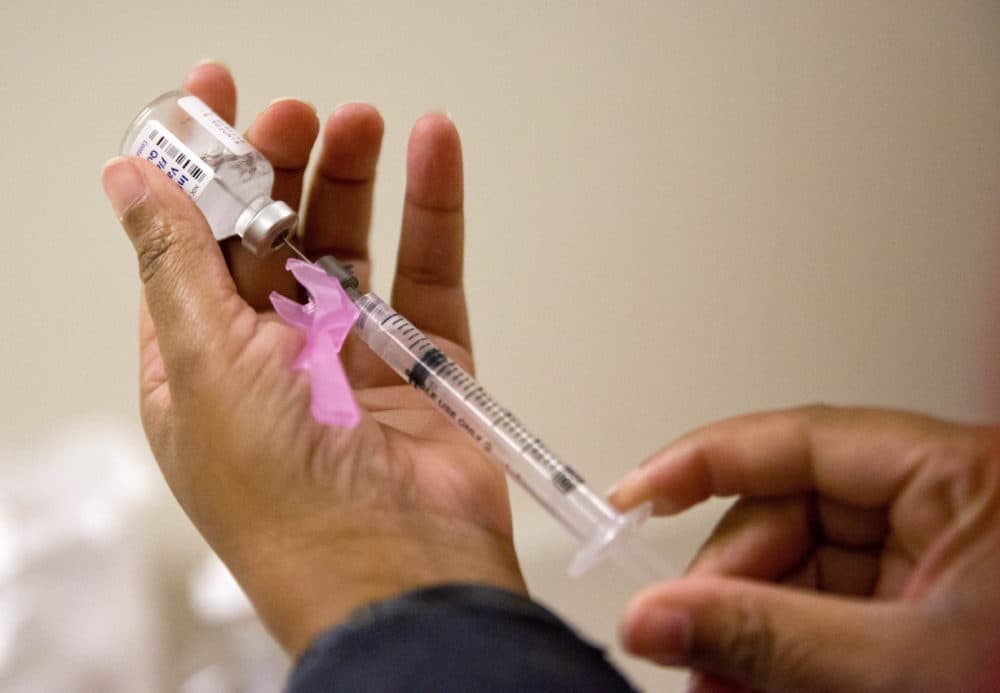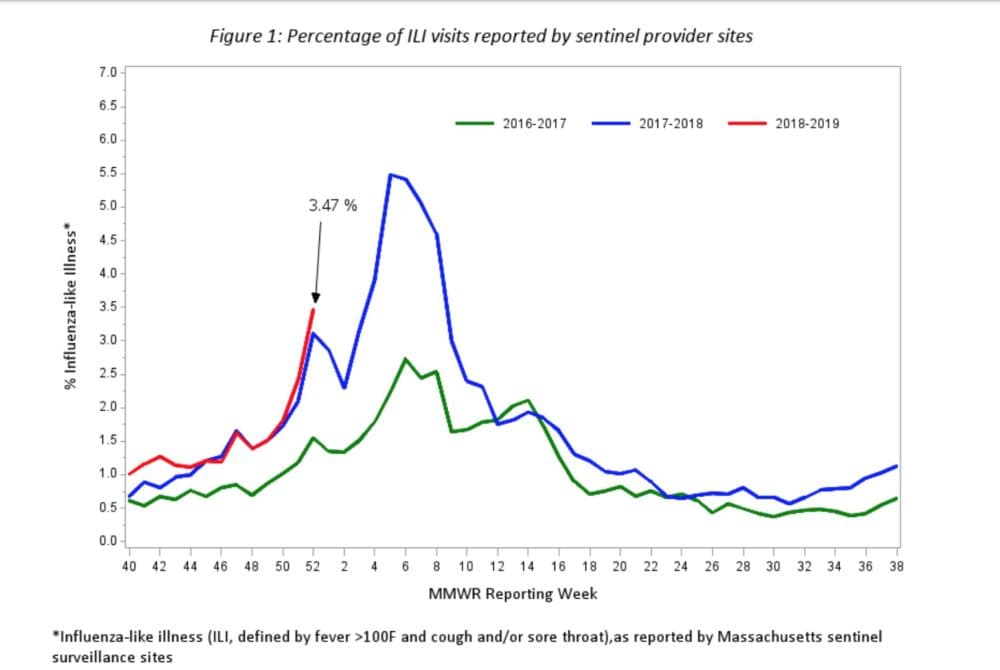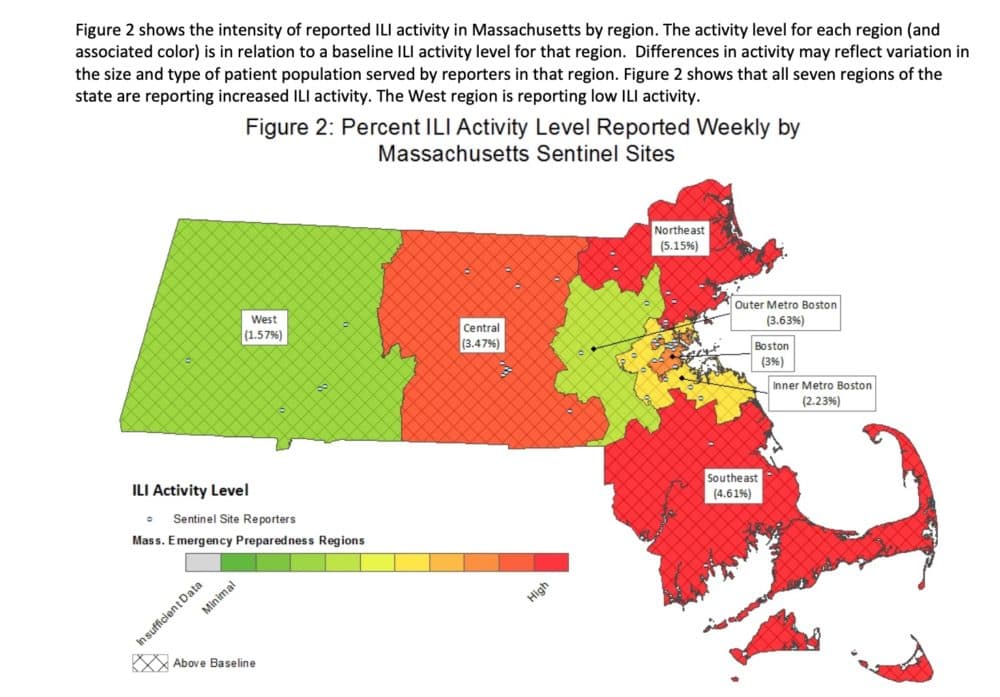Advertisement
The Flu Is Spiking In Mass. Here's What To Know About What Looks To Be Another Nasty Year

The flu season is definitely here. Cases of flu are spiking dramatically in Massachusetts — lab diagnoses, hospitalizations, doctor visits — and so far this year is shaping up to be as nasty as last year, though with a different dominant strain.
Our conversation on Radio Boston:
Callum Borchers: What are we seeing out there?
Carey Goldberg: First, a quick look back to last winter. It was a particularly bad flu season last year. It's estimated that more than 80,000 Americans died, including 180 children and teens — that was the highest number ever — though the vast majority of deaths were in people over 65. The dominant strain was H3N2, which is a particularly nasty bug.
So, a reminder that even though millions of us get the flu every year without serious consequences, it's no joke.
It's also no joke when you're flat on your back in bed for days feeling like you've been run over by a truck.
We had a useful NPR report on this morning about how to tell the flu from a cold — with flu, it's likelier to come on quickly, bring a higher fever, and include a lot of body aches, that feeling that you can't get out of bed.
Right — plus oftentimes really heavy coughing.
So what's the picture in Massachusetts right now?
Not pretty. Here's Dr. Larry Madoff, director of epidemiology and immunization at the Department of Public Health:
"The flu season is definitely picking up, it's well under way, and it's actually tracking very close to last season which was a severe flu season."

Which isn't good, because last year was so awful — in fact, in the final week of 2018, our line on the flu graph spiked even a little bit higher than last year — but we're only now heading into what's usually peak flu season, and flu is notoriously unpredictable.
Dr. Madoff points out another difference this year in the strain of flu that's dominant: "This season, the predominant strain in Massachusetts and most of the country is the H1N1 strain, whereas last year's season was mostly due to the H3N2 strain. So it's different — the H1N1 tends to affect younger rather than older people but it can certainly be just as severe."
And I gather that Massachusetts is an early adopter this year, so to speak — we've entered a high flu season earlier than most other states. Do we know why?
Not really. I asked Dr. Brian Chow, an infectious disease specialist at Tufts Medical Center, and he says many factors may be at play: "Sometimes it can be as simple as people traveling home from other parts of the country for the holidays. Sometimes it could be the weather, and the conditions that are favorable for the virus to start replicating and persisting in the environment more. But it's a complicated interplay, and there's no one single explanation as to why it would be starting now, and why we would be being hit harder compared to prior years."
I also asked Dr. Chow about some new research that's just out in the journal Pediatrics today, about the nasal vaccine, also known as FluMist...
... Which gets squirted into your nose, sort of like Flonase, rather than you having to get a shot — a very appealing prospect to a lot of kids and many adults as well.
It was, but for the last couple to three years, the nasal vaccine has been very out of favor. And the new research confirms that FluMist, which initially looked like it was more effective than shots when it came out about 15 years ago, then came to be less effective than shots, at least here in the United States, though not in Europe.
But it's still considered a viable form of the vaccine?
Yes, it's a little confusing — the CDC still includes it in its list of flu vaccines and expresses no preference for one over another. The American Academy of Pediatrics did not recommend it this year. And it's all pretty moot because I can tell you as a mother who called around looking for the nasal vaccine, it's pretty close to nowhere to be found.
So what would explain how it lost effectiveness?
Dr. Chow says there are many theories, but it's not clear. But the vaccine's maker has changed the formulation a bit and the data on the new version is looking good in animals and in Britain, so he thinks there's a good chance it will be back again next year: "I think that we'll have to continue to watch and see the effectiveness of FluMist based on this year's data, to see if it works. We can't really explain why there's differences seen around the world, but I think we need to look and make sure that in the United States, it is an effective vaccine."
And when I spoke to the lead researcher on that new study, Jessie Chung at the CDC, she said maybe the moral of this story is that it's really important to keep an eye on how effective vaccines are and make sure they're staying potent.
So Carey, speaking of vaccine effectiveness, that's a complaint we often hear, that the flu vaccine is only 30 or 40 or 20 percent effective, so it's just not the greatest shield, and why bother? What do we know about this year's vaccine?
Well, first, last year — the vaccine ended up being about 40 percent effective overall, which clearly is not ideal, but the vaccine is also known to reduce your symptoms if you do get the flu. On this year, here's Dr. Madoff from the Department of Public Health on the match between this year's strains of flu and this year's vaccine: "Both of those strains, the H1N1 and the H3N2 that we're seeing this year closely match the vaccine, and so we're optimistic that the vaccine will be more effective this year."
Let's hope. And let's really hope for rapid progress by the scientists who are working on a universal flu vaccine — one that you can get just once for your whole life, like some other vaccines. But everyone I spoke with said it's going to be at least five years until there's even any hope of that.
So for the meanwhile, would you like to close with one more pitch for vaccination?
Actually, I'd like Dr. Madoff to do it for me: "It's important for people to take responsibility for not just themselves but other people who can catch the flu from them. And so getting immunized not only stops you from getting the flu, it stops those around you — who may be more vulnerable — from getting the flu.
"And also just a reminder to stay home from work or school if you're sick and you have the flu because that also is how we spread it."

